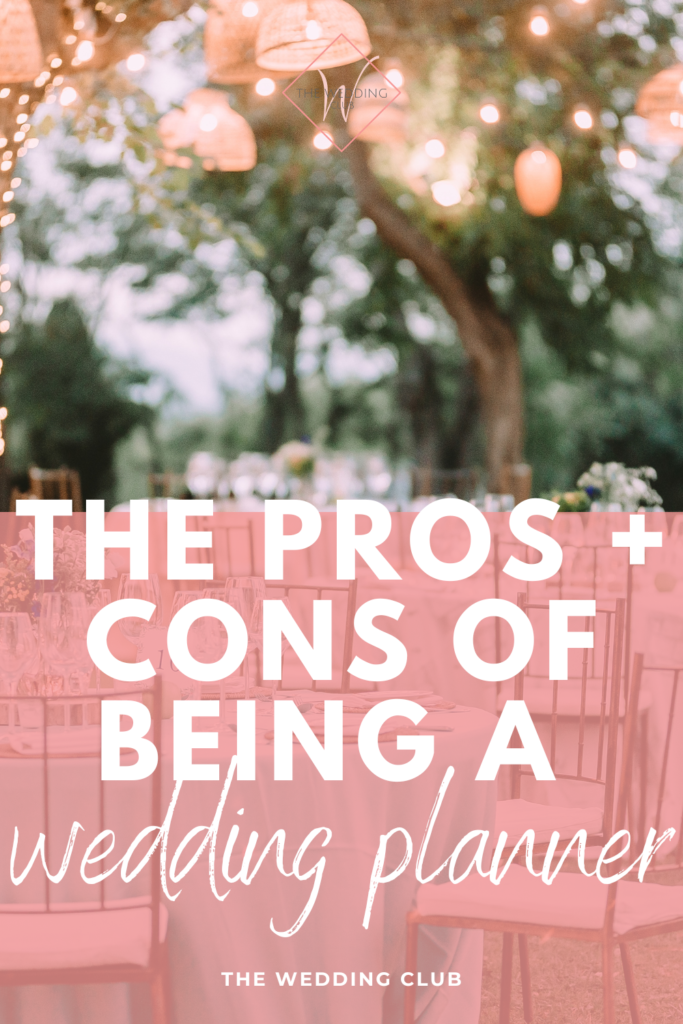So you want to become a wedding planner? Embarking on this exciting journey means stepping into a world where creativity meets meticulous organization.
A wedding planner job is not just about arranging events; it’s about crafting unforgettable moments that couples will cherish for a lifetime.
As you consider becoming an event planner specializing in weddings, it’s essential to understand both the glittering perks and the hidden challenges of this profession.
Planning a Wedding?
Save time and effort by grabbing our Wedding Planner Bundle! With over 500+ pages to choose from + edit, we made sure to not leave anything out, giving you peace of mind!
The wedding planner career offers a unique blend of artistic expression and strategic planning.
You’ll find yourself creating detailed wedding planner checklists, collaborating with various vendors, and possibly even starting your own wedding planner business.
Whether you choose to work independently or join an established wedding planning business, your role as a wedding consultant will be pivotal in bringing dreams to life.
However, the path is not always adorned with rose petals. The planning business demands long hours, exceptional stress management, and the ability to handle unexpected hurdles with grace.
This blog post will delve into the pros and cons of being a wedding planner, providing you with a comprehensive overview to help you make an informed decision about pursuing this career.
The pros and cons of being a wedding planner
The journey of becoming an event planner is filled with creativity, excitement, and the satisfaction of bringing visions to life. As a wedding consultant, you play a pivotal role in crafting unforgettable experiences that couples cherish forever.
No matter which role and path you choose in the wedding planning industry. the pros and cons are quite similar. Let’s have a look at the advantages first…
Pros of Being a Wedding Planner
Embarking on a wedding planner job offers numerous benefits that make this career rewarding. Let’s delve deeper into each advantage to give you a comprehensive understanding of what to expect.
1. Creative Expression
Opportunity to Innovate: As a wedding planner, you have the chance to bring fresh ideas to life.
Each couple has a unique love story, and you get to translate that into a memorable event. Whether it’s designing a fairytale garden wedding or a modern minimalist ceremony, your creative input is invaluable.
Personalized Themes: Tailoring events to reflect the personalities and preferences of the couple is where your creativity shines.
From selecting color palettes to designing custom decor, you have the freedom to craft a day that’s truly one-of-a-kind.
Expression Through Collaboration: Working intimately with couples allows you to explore new ideas and push creative boundaries. This collaborative effort not only brings their vision to life but also enhances your own artistic repertoire.
Incorporating unique elements like personalized vows, thematic decor, or unconventional venues can set your wedding planner career apart.
Your ability to innovate ensures that no two weddings are alike, keeping your work exciting and fulfilling.
“Every wedding is a blank canvas waiting for your artistic touch.”
Tips:
- Stay updated with the latest wedding trends by following industry blogs and attending bridal expos. This keeps your ideas fresh and appealing to clients.
- Keep an inspiration board or digital folder of creative ideas and past projects. This resource can help spark new concepts and provide clients with visual examples of your creative capabilities.
2. Emotional Fulfillment
Making Dreams Come True: There’s immense satisfaction in knowing you’ve played a pivotal role in one of the most significant days of someone’s life.
Seeing the joy and gratitude on a couple’s face as their vision comes to life is priceless.
Building Relationships: Working closely with clients and vendors often leads to lasting relationships. These connections not only enrich your personal life but can also lead to future referrals, enhancing your wedding planning business.
Contributing to Lifelong Memories: As a wedding consultant, you play a significant role in one of the most important days of a couple’s life. The emotional reward of seeing the happiness and relief on their faces when everything goes according to plan is immeasurable.
Your efforts help create stories and memories that will be cherished and recounted for generations, giving your work a lasting impact beyond the event itself.
Tips:
- Keep a scrapbook or digital portfolio of thank-you notes and testimonials. On challenging days, revisiting these can reignite your passion and remind you of the impact you have.
- Engage with clients on a personal level to understand their story. This connection not only enhances the event’s personalization but also enriches your experience and satisfaction.

3. Networking Opportunities
Industry Connections: Collaborating with a diverse range of professionals such as photographers, caterers, florists, and venue coordinators expands your professional network.
These relationships are crucial for creating seamless events and can lead to mutually beneficial partnerships.
Expanding Business Reach: Positive experiences encourage vendors to refer you to their clients. This word-of-mouth promotion is invaluable for growing your wedding planner career.
Access to Exclusive Resources: Building strong relationships with vendors and venues can grant you access to special rates, early bookings, or exclusive services that aren’t available to the general public.
These advantages allow you to offer more value to your clients, enhancing your reputation in the wedding planning business. Networking also keeps you informed about industry developments, new products, and emerging trends.
Tips:
- Attend local business networking events and join professional associations like the Association of Bridal Consultants (US) to meet potential collaborators.
- You can also search on apps like MeetUp or look for Facebook events. If there are none in your area, consider starting your own group or association.
- Maintain a professional yet friendly relationship with vendors. Regularly express appreciation for their work and consider collaborations that can benefit both parties.
4. Flexible Schedule
Self-Management: As the owner of your planning business, you have control over your schedule.
This flexibility allows you to work during your most productive hours and manage personal commitments more effectively.
Work-Life Balance: While there will be busy periods, especially during peak wedding season, the ability to schedule downtime helps prevent burnout and maintains a healthy balance between work and personal life.
Customization of Workload: Flexibility means you can tailor your workload to fit your personal and professional goals. Whether you prefer to take on a few high-profile weddings a year or multiple smaller events, you have the autonomy to decide.
This control helps prevent burnout and ensures you remain passionate about your wedding planner job.
Tips:
- Use time-management tools and apps to organize your schedule efficiently. Allocate specific times for client meetings, administrative tasks, and personal time.
- Periodically assess your workload and adjust accordingly. Don’t hesitate to decline projects if your schedule is full; quality over quantity enhances your brand.
5. Entrepreneurial Potential
Starting Your Own Business: Launching a wedding planner business allows you to be your own boss and make strategic decisions about the direction of your company. This autonomy can be highly rewarding for those with an entrepreneurial spirit.
Growth Opportunities: As your reputation grows, you can expand your services, perhaps by hiring a team, offering event planning for other occasions, or even consulting services.
This scalability can significantly increase your income and influence in the industry.
Brand Development: Owning your wedding planner business allows you to create a brand that reflects your unique style and values.
Specializing in niches like vintage weddings, sustainable events, or tech-savvy ceremonies can distinguish you from competitors.
A strong brand attracts clients who resonate with your approach, fostering loyalty and word-of-mouth referrals.
Tips:
- Develop a solid business plan outlining your goals, target market, and financial projections. This roadmap will guide your business decisions and growth strategies.
- Invest in professional branding, including a logo, website, and marketing materials that consistently represent your business’s identity.

6. Diverse Work Environment
Variety of Settings: From rustic barns and elegant ballrooms to beachside ceremonies and mountain retreats, the venues you’ll work in are diverse and exciting. This variety keeps the job fresh and prevents monotony.
Dynamic Tasks: Each day brings new challenges and tasks, whether it’s meeting with clients, negotiating with vendors, or coordinating event logistics. This dynamic environment can be stimulating and fulfilling for those who thrive on variety.
Cultural Enrichment: Working with a diverse clientele exposes you to various traditions, customs, and perspectives. Incorporating these elements into weddings not only enriches the event but also broadens your understanding and appreciation of different cultures.
This diversity enhances your adaptability and creativity as an event planner.
Tips:
- Embrace the unpredictability by staying adaptable. Always have a backup plan for venue changes or weather-related issues.
- Educate yourself on cultural traditions and be respectful of customs. This knowledge can prevent misunderstandings and elevate the authenticity of the event.
7. Travel Opportunities
Destination Weddings: Specializing in destination weddings can take you to exotic locations around the world.
This not only enriches your personal experiences but also broadens your professional expertise.
Cultural Experiences: Working with clients from different backgrounds exposes you to various traditions and customs, enhancing your cultural sensitivity and allowing you to create more inclusive events.
Networking on a Global Scale: Traveling for destination weddings allows you to build an international network of vendors and venues.
These connections can lead to unique opportunities, such as planning weddings in exclusive locations or collaborating with renowned industry professionals. Expanding your horizons globally can significantly enhance your planning business.
Tips:
- Familiarize yourself with international wedding customs and legal requirements. This knowledge can be a unique selling point for clients seeking destination weddings.
- Learn basic phrases in the local language and familiarize yourself with regional laws and customs when planning international events.
Planning a Wedding?
Save time and effort by grabbing our Wedding Planner Bundle! With over 500+ pages to choose from + edit, we made sure to not leave anything out, giving you peace of mind!
8. Financial Rewards
Earning Potential: The wedding industry is lucrative, and with a strong reputation, you can command higher fees for your services.
High-end clients are often willing to pay a premium for experienced planners who can deliver exceptional results.
Additional Services: Offering extra services such as day-of coordination, bridal showers, or honeymoon planning can increase your revenue streams.
Passive Income Opportunities: Beyond planning events, you can generate additional income by creating and selling resources like ebooks, templates, or wedding planner checklists.
Offering online courses or workshops can also position you as an industry expert. These ventures not only supplement your income but also expand your professional footprint.
Tips:
- Regularly review your pricing structure to ensure it reflects your experience and the value you provide. Don’t undervalue your services.
- Identify areas of expertise that others might find valuable and consider developing them into marketable products or services.
9. Personal Growth
Skill Development: The role requires honing a variety of skills, including communication, organization, negotiation, and problem-solving. These skills are transferable and beneficial in all areas of life.
Confidence Building: Successfully managing complex events and overcoming challenges boosts your self-esteem and professional confidence.
Leadership and Team Management: As your planning business grows, you may hire assistants or a full team, which develops your leadership skills.
Managing a team teaches you delegation, mentorship, and team-building strategies. These skills are essential for scaling your business and can lead to greater professional satisfaction.
Tips:
- Invest in professional development through workshops and courses. Continuous learning keeps your skills sharp and competitive.
- Invest time in leadership training and team development activities to build a cohesive and efficient team.

10. Job Satisfaction
Positive Impact: Knowing that your efforts have contributed to a cherished memory for couples and their families provides a deep sense of fulfillment.
Pride in Accomplishment: Each completed event is a testament to your hard work and dedication. Celebrating these achievements motivates you to strive for excellence continually.
Recognition and Appreciation: Positive feedback from clients and peers can be incredibly rewarding.
Awards, testimonials, and high ratings boost your credibility and provide personal validation for your hard work. This recognition can fuel your passion and commitment to excellence in your wedding planner career.
Tips:
- After each event, take time to reflect on what went well and areas for improvement. This practice fosters growth and enhances future performance.
- Encourage satisfied clients to leave reviews or testimonials. Display these accolades prominently on your website and marketing materials.
Additional Tips for Prospective Wedding Planners:
Develop a Signature Style: Having a distinct style can set you apart in a crowded market. Whether it’s elegant luxury or boho-chic, clients will seek you out for your unique touch.
Create a Strong Online Presence: A professional website and active social media profiles showcase your portfolio and help attract clients. Share high-quality photos and behind-the-scenes glimpses of your work.
Use a Comprehensive Wedding Planner Checklist: Staying organized is crucial. A detailed checklist ensures no detail is overlooked and helps manage timelines effectively.
Prioritize Client Communication: Clear and consistent communication builds trust and ensures that you and your clients are on the same page throughout the planning process.
Stay Passionate: Your enthusiasm is contagious. Clients will feel more confident and excited about their wedding when they see your genuine passion for creating their perfect day.
Cons of Being a Wedding Planner
Despite the perks, there are challenges in the wedding planner career to consider. Being aware of these can help you prepare and develop strategies to manage them effectively.
1. High-Stress Levels
Pressure to Perfection: Clients often expect their wedding day to be flawless, placing immense pressure on you to deliver perfection.
The weight of orchestrating a once-in-a-lifetime event where any mistake could have significant emotional and financial repercussions can be overwhelming.
Crisis Management: Unforeseen issues are inevitable, whether it’s a vendor cancellation, adverse weather, or a wardrobe malfunction.
As the planner, you’re responsible for resolving these problems swiftly and discreetly to keep the event running smoothly.
Multi-Tasking Demands: Wedding planners often juggle numerous tasks simultaneously, from coordinating with multiple vendors to managing tight schedules and overseeing staff.
This constant balancing act can lead to cognitive overload and increased stress levels. The need to be detail-oriented while keeping the big picture in mind requires mental agility and resilience.
Tips:
- Develop strong stress-management techniques, such as deep-breathing exercises or meditative practices. Being calm under pressure is crucial.
- Always have a contingency plan (or several) for potential problems.
- Develop effective stress management techniques such as mindfulness, regular exercise, or hobbies outside of work to help maintain your well-being.
- Practice effective delegation by assigning tasks to trusted team members or assistants. This not only reduces your workload but also empowers your team and enhances overall efficiency.
2. Irregular Income
Seasonal Demand: The wedding industry experiences peaks and troughs throughout the year, often influenced by seasons and holidays. This fluctuation can lead to periods with little to no income.
Unpredictable Bookings: Clients may book your services months or even years in advance, but cancellations can occur, impacting your financial stability.
Client Payment Delays: Dependence on client payments can lead to cash flow issues, especially if clients delay payments or default on their contracts.
Additionally, you may need to cover upfront costs for deposits or supplies, tying up your funds until you are reimbursed.
Tips:
- Create a financial buffer by saving during peak seasons to cover expenses during slower periods.
- Diversify your services to include event planning for other occasions like corporate events or parties to maintain a steady income.
- Implement a strict payment schedule with clear terms outlined in your contracts.
- Consider requiring a non-refundable deposit and milestone payments to secure your cash flow throughout the planning process.

3. Unpredictable Work Hours
Long Days: Wedding days can start early in the morning and extend late into the night. Additionally, meetings with clients may need to occur after their work hours, including evenings and weekends.
Availability: Clients may expect you to be accessible at all times for updates or to address concerns, infringing on your personal time.
Disrupted Personal Routines: The irregular hours can make it challenging to maintain personal routines, such as regular exercise, meals, or sleep patterns. Late-night events and early morning setups can lead to fatigue and impact your health over time.
Tips:
- Set clear boundaries from the outset.
- Establish acceptable communication hours in your contract.
- Use tools like scheduling apps to manage appointments effectively.
- Prioritize self-care by scheduling time for meals, exercise, and rest within your daily agenda. Even short breaks can significantly improve your well-being and productivity.
4. Difficult Clients
High Expectations: Some clients may have unrealistic expectations or change their minds frequently, making it challenging to meet their demands.
Emotional Stress: Weddings can be emotionally charged events, and clients may project their stress onto you. Dealing with family dynamics and disagreements can also be taxing.
Micromanagement and Lack of Trust: Some clients may struggle to relinquish control, leading to micromanagement that hampers your ability to execute tasks efficiently. This can create tension and slow down the planning process.
Tips:
- Develop strong communication skills and practice empathy.
- Setting realistic expectations early and documenting all agreements can help manage client relationships.
- Consider conflict resolution training to navigate sensitive situations.
- Establish trust by showcasing your expertise through past work and testimonials.
- Set clear boundaries and communicate the benefits of allowing you to manage the details to achieve the best outcome.
5. Physical Demands
On Your Feet: Coordinating events often requires long hours of standing and moving around, which can be physically exhausting.
Manual Labor: Tasks may include lifting heavy items, arranging furniture, or setting up decorations, which can be physically demanding.
Exposure to Environmental Conditions: Working in various environments means dealing with unpredictable weather and physical settings. Outdoor weddings may expose you to extreme temperatures, rain, or uneven terrain, adding physical strain to your duties.
Tips:
- Maintain a healthy lifestyle to keep your energy levels high.
- Wear comfortable shoes and attire during events.
- Consider hiring assistants to share the workload.
- Prepare an event-day kit that includes essentials like weather-appropriate clothing, hydration supplies, and first-aid items to address any physical discomforts promptly.
Planning a Wedding?
Save time and effort by grabbing our Wedding Planner Bundle! With over 500+ pages to choose from + edit, we made sure to not leave anything out, giving you peace of mind!
6. Competitive Industry
Market Saturation: With many individuals entering the field, standing out can be challenging. Clients have numerous options, making it harder to secure bookings.
Continuous Marketing: To stay relevant, you need to invest time and resources into marketing, including social media, networking, and advertising, which can be time-consuming and costly.
Price Wars and Undercutting: The saturation of wedding planners in the market can lead to competitors lowering prices unsustainably. This can pressure you to reduce your rates, potentially impacting your profitability and the perceived value of your services.
Tips:
- Identify and promote your unique selling proposition (USP).
- Specializing in a niche market, such as eco-friendly weddings or luxury events, can help differentiate your services.
- Focus on differentiating your services through specialization, exceptional quality, and unique offerings rather than competing on price alone.
- Educate clients on the value you provide to justify your pricing.

7. Emotional Drain
Absorbing Stress: Constantly managing the stress and emotions of clients can take a toll on your mental health.
Personal Sacrifices: You may have to miss personal events or time with loved ones due to work commitments, impacting your own emotional well-being.
Compassion Fatigue: Constantly supporting clients through their emotional highs and lows can lead to emotional exhaustion. Over time, this can diminish your ability to empathize and affect your personal relationships and mental health.
Tips:
- Prioritize self-care by scheduling regular downtime.
- Consider professional support like counseling if you find the emotional demands overwhelming.
- Establish emotional boundaries by practicing active listening without internalizing clients’ stress.
- Engage in regular activities that replenish your emotional energy, such as meditation, hobbies, or time with friends.
8. Legal Responsibilities
Contracts and Agreements: Drafting and understanding legal documents is essential to protect yourself and your clients. Misinterpretations can lead to disputes or legal action.
Liability Risks: If something goes wrong, you could be held responsible, especially if you lack proper insurance coverage.
Regulatory Compliance: Navigating the legalities of event planning, such as obtaining permits, adhering to safety regulations, and complying with local laws, can be complex and time-consuming.
Non-compliance can result in legal penalties and damage to your reputation.
Tips:
- Consult with a legal professional to create comprehensive contracts.
- Invest in liability insurance to protect your business from potential lawsuits.
- Stay informed about legal requirements by subscribing to industry newsletters or joining professional associations.
- Consider consulting with a legal expert to ensure all aspects of your business are compliant.
9. High Initial Investment
Startup Costs: Launching your wedding planning business may require significant upfront expenses for marketing materials, website development, professional photography, and office setup.
Ongoing Expenses: Regular costs include attending networking events, maintaining certifications, advertising, and updating equipment or software.
Financial Risk and Uncertainty: The significant upfront investment required for marketing, training, and equipment can be daunting. Without a steady stream of clients, recouping these costs may take longer than anticipated, posing a financial risk.
Tips:
- Create a detailed budget and business plan before starting.
- Explore cost-effective marketing strategies like social media and word-of-mouth referrals.
Start small by leveraging free or low-cost marketing channels like social media and networking events.
Reinvest profits gradually to grow your business sustainably without overextending financially.

10. Work-Life Balance Challenges
Personal Time: The demands of the job can encroach on your personal life, making it difficult to find time for relaxation and hobbies.
Burnout Risk: The combination of physical demands, emotional stress, and irregular hours can lead to fatigue and burnout.
Impact on Personal Relationships: The demanding schedule can strain relationships with family and friends due to missed events or limited availability. This can lead to feelings of isolation or resentment if not addressed.
Tips:
- Implement time-management strategies and consider delegating tasks when possible.
- Remember that it’s okay to say no to additional commitments if it means preserving your well-being.
- Communicate openly with loved ones about your schedule and the importance of your work.
- Plan and prioritize quality time together to maintain strong personal connections.
Additional Important Things to Note:
Technological Demands: Keeping up with the latest planning software, virtual tour technologies, and social media trends requires ongoing learning and adaptation.
Tip: Allocate time each month to learn about new tools and technologies that can enhance your services and streamline your workflow.
Sustainability Concerns: Clients are increasingly interested in eco-friendly weddings, which may require additional research and effort to source sustainable options.
Tip: Build a network of vendors who offer sustainable services and stay informed about eco-friendly trends to meet this growing demand.
Emotional Investment: Becoming too emotionally invested in clients’ weddings can blur professional boundaries and increase stress.
Tip: Maintain professionalism by showing empathy without becoming personally involved. This balance protects your emotional well-being.
BONUS: 10 Steps to Become a Wedding Planner
Research the Profession
- Understand the roles, responsibilities, and demands of a wedding planner to ensure it aligns with your interests and strengths.
Gain Relevant Education
- Consider obtaining a degree or certification in event planning, hospitality management, or a related field to build foundational knowledge.
Develop Essential Skills
- Enhance your organization, communication, negotiation, and problem-solving skills, which are crucial for success in wedding planning.
Gain Experience
- Volunteer or intern with established wedding planners or event planning companies to acquire practical experience and industry insights.
Build a Portfolio
- Document your work with photos and testimonials to showcase your abilities to potential clients.
Network Within the Industry
- Attend industry events, join professional associations, and connect with vendors to build a strong professional network.
Create a Business Plan
- Outline your services, target market, pricing, and marketing strategies if you plan to start your own wedding planning business.
Obtain Necessary Licenses and Insurance
- Ensure compliance with local regulations by acquiring required business licenses and securing liability insurance.
Market Your Services
- Develop a professional website, utilize social media, and engage in advertising to reach potential clients and build your brand.
Continuously Educate Yourself
- Stay updated on industry trends, attend workshops, and pursue ongoing education to enhance your expertise and remain competitive.
What qualifications do I need to become a wedding planner?
While formal education isn't mandatory, certifications in event planning and experience can enhance credibility.
How do I start my own wedding planner business?
Begin by creating a business plan, registering your wedding planning business, and marketing your services.
Is it necessary to have a certification to be a wedding consultant?
Certifications are not required but can provide valuable knowledge and boost client confidence.
How much can I earn as a wedding planner?
Earnings vary based on location, experience, and clientele, ranging from moderate to high income.
What is the difference between a wedding planner and a wedding consultant?
The terms are often used interchangeably, but a consultant may focus more on advising, while a planner handles execution.
Love to pin beautiful pins to Pinterest? Here are some images for you to use...




by Tanya Guilfoyle
Born in Johannesburg, South Africa, Tanya has been an active contributor and planner in the wedding industry since 2016. When not writing useful content for brides and wedding professionals, she can be found designing templates for her Etsy shop, TWCprintables.
Planning a Wedding?
Save time and effort by grabbing our Wedding Planner Bundle! With over 500+ pages to choose from + edit, we made sure to not leave anything out, giving you peace of mind!



